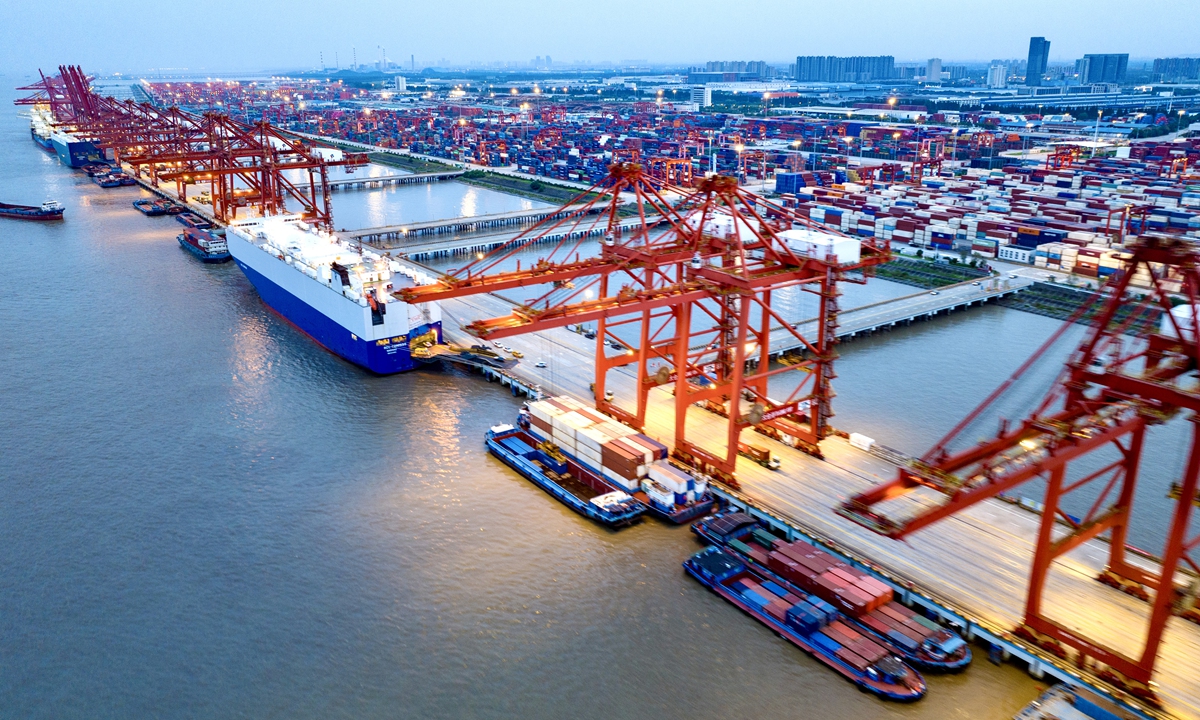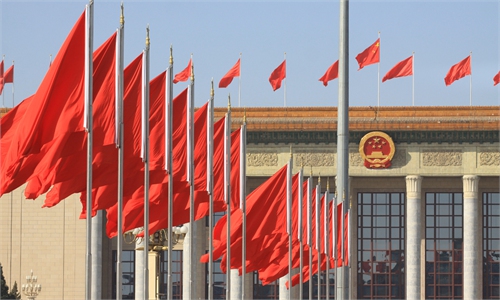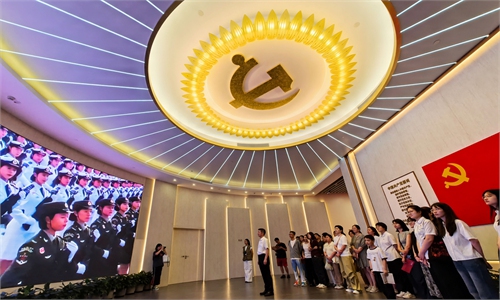Third plenum to usher China into a new chapter in the march toward Chinese modernization

Ships park at a container terminal at the fourth phase project of the Taicang Port in East China's Jiangsu Province, on July 9, 2024. Photo: VCG
As the third plenary session of the 20th Communist Party of China (CPC) Central Committee will be convened on Monday, the world is watching how the pivotal gathering, also known as the third plenum, will identify priorities for comprehensively deepening reform, map out a blueprint for its long-term economic development and open up a new chapter in the country's march toward Chinese modernization.
The plenum is being convened at an important juncture, observers said, as internally, China, while remaining on a steadfast journey toward the secondary centenary goal, is now at the critical stage of shifting gears to high-quality development mode. Externally, "profound" changes have taken place in international environment amid Western blockade against China's rise, US-instigated camp confrontation and rising geopolitical tensions. Those complex circumstances call for the CPC leadership to have a fresh assessment of the situation and formulate top-level design to sail through the choppy water, economists said.
According to Xinhua News Agency, the upcoming plenum will primarily examine issues related to further comprehensively deepening reform and advancing Chinese modernization, noted a meeting of the Political Bureau of the CPC Central Committee in June chaired by Xi Jinping, general secretary of the CPC Central Committee.
A wide range of reform focused policies are anticipated to be high on the agenda, including the creation of new quality productive forces, steady support to private economy, coordination on development and security, as well as firm commitment to opening-up, among other items, which observers said will pave the way for achieving the country's overarching goal of Chinese modernization.
While negative voices in the West have spared no efforts to discredit China's reform efforts or push bearish views on Chinese economy, the monumental gathering is a timely rebuttal to those smearing campaigns, observers said, as it offers a vivid manifestation of the CPC's courage and confidence to spearhead with "systemic, holistic, forward-looking" reforms even as "changes unseen in a century unfold rapidly across the world."
The inborn reformer spirit of the Party, which has ushered the country - since the third plenum in 1978 - into decades of miraculous rise and fueled the launch of comprehensively deepening reform, is also set to decisively lead China to embark on a relentless journey to defy headwinds and create another economic miracle, scholars said.
This optimism is derived from China's institutional advantages, which are underpinned by the CPC's governing capacity to unite the whole nation closely in working out correct solutions to challenges, foreign observers said. A clear and predictable development path of the world's second-largest economy, under the CPC leadership, will also channel stability and give a much-needed positivity to a floundering world.
Historic significance
As reform is the hallmark of third plenums, the latest one is not an exception. Some analysts anticipated the event to bear historic significance and usher the country into "deeper water" of reform areas in light of the new global and domestic situations.
Typically, each gathering produces a landmark reform agenda concerning every aspect of the economy.
For example, in 1978, the third plenary session of the 11th CPC Central Committee decided to conduct the reform and opening-up policy that paves way for China's decades of startling economic rise. Also, the third plenary session of the 18th CPC Central Committee, convened in 2013 under Xi's leadership, was also hailed as a milestone as it marked the dawn of a new era of reform.
The CPC leadership has sent out resounding reform signals on several occasions ahead of the plenum.
"Reform is the driving force for development," Xi said, while chairing in May a symposium in Ji'nan, capital of East China's Shandong Province, attended by representatives from both business and academia. The crucial role of reform was also highlighted in this year's Government Work Report.
While the third plenary session of the 20th CPC Central Committee will carry on the tradition of inheriting reform, Cao Heping, an economist from Peking University, told the Global Times that taking account of the complex domestic and international landscape that is strikingly different from the previous two "third plenums" in 2013 and 2018, it is of great urgency that the upcoming gathering provides a fresh assessment of the new situation, especially on those "important emerging issues that have yet been discussed but require immediate solutions."
"The outside pressure is increasing … and it is also necessary to acknowledge that the Western developed countries will continue the policy of protectionism, destruction of production chains and creation of technological barriers [targeting China] over the coming decades," Alexander Lomanov, deputy director for Scientific Work under the Primakov National Research Institute of World Economy and International Relations at Russian Academy of Sciences, told the Global Times.
It is therefore of utmost importance that third plenary session charts out a top-level design for the country's economic path and updated reform priorities, Lomanov added. He also suggested China to accelerate the reform and opening-up measures to address a myriad of challenges, for example doubling down efforts in opening-up and expanding the circle of new partners.
According to Cao, the plenum also plays a "bridging role" as it offers the window opportunity for deepening reforms based on the social-economic progress made since the 20th CPC National Congress in 2022.
The report to the 20th CPC National Congress delivered by Xi in October 2022 positioned realizing the second centenary goal and advancing the rejuvenation of the Chinese nation on all fronts through a Chinese path to modernization as the Party's central task, according to a Xinhua report. China accomplished its first centenary goal of building a moderately prosperous society in all respects in 2021.
Observers said that one of the focal points of the plenum is to effectively promote the Chinese modernization through reforms in a variety of sectors including economic development, innovation, as well as high-level opening-up.
Zhang Xixian, a professor from the Party School of the CPC Central Committee, told the Global Times that China is now at the stage of transforming from quantity-driven growth to high-quality development, a process that sees the rise of new growth drives but is also confronted with increasing downward pressure ranging from structural slowdown, property downturn to weak consumer demand.
China is scheduled to release its first-half GDP figure in mid-July. With an expansion of 5.3 percent in the first quarter, the world's second-largest economy started 2024 strongly and is on a firm track to achieve its goal of expanding at a rate around 5 percent this year.
"We will see deeper, broader and thorough reform steps being announced at the top-level to consolidate the growth momentum and inject new strong impetus into the high-quality development path, while also diluting those rising uncertainties," Tian Yun, an economist based in Beijing, told the Global Times.
He exemplified by fiscal reforms, which could restructure the financing responsibility between central and local governments, and stepped-up reform measures to boost China's technological self-sufficiency in pursuit of economic security.
As the development of social productivity is a key step in achieving Chinese modernization, Zhang also anticipated more scientific planning on the development of new quality productive forces, such as leveraging national strengths in boosting the development of emerging areas like artificial intelligence (AI) and big data while also upgrading traditional industries across the economy through technological innovation.
In 2024, developing new quality productive forces was written into the Government Work Report for the first time.
Institutional advantage
China should take resolute steps to remove the ideological and institutional barriers hindering the advancement of Chinese modernization, and double down on its efforts to resolve deep-seated institutional challenges and structural issues, Xi said at a symposium in Shandong in May.
Observers said that the remarks underscored that new breakthroughs in economic system reform will also be placed at the center of the plenum. This could include a systemic perspective to approach the relationships between the government and the market, the economy and society, as well as coordinating the protection of national security with economic development.
"The plenum can be expected to affirm the 'decisive' role of the market in the resources allocation," Lomanov said, noting that this equates to an assurance on the legal institution of China's socialist market economy, which is key to bolstering business confidence.
According to Cao, there will be also be new signals on the Party's unswerving support to the private economy, and a further institutional guarantee that state-owned enterprises (SOEs), private businesses, and foreign-funded companies all play an important role in China's modernization drive.
China has started drafting a law on promoting the private economy, and the legislative process will be accelerated, Chinese media reported in February.
Ahead of the meeting, several Western media outlets have been peddling pessimistic views, claiming that China's reform is "stagnating."
Some also attempted to play down the expectations on the upcoming gathering and alleged that it would only generate small reform steps. Analysts said that the convening of the third plenum also timely debunks those badmouths, demonstrating that China is not retreating, but rather is fully committed to the Party's reformer spirit, and is in a nonstop process of forging ahead with deepening reforms to address challenges.
There are multiple reasons to be optimistic about the prospects of reforms under the CPC's leadership, said experts.
According to Chinese and foreign economists, the CPC, with its commitment to internal reform, efficiency in decision-making and capacity in turning blueprints into concrete actions, has ensured the sustained success of economic reform over past years.
Over the past decade, more than 2,000 reform measures have been put in place, the Xinhua News Agency reported, which enabling the country not only to eliminate extreme poverty, but also seeing its economic scale more than double to become a major global engine of growth, among other remarkable achievements.
Looking forward, the CPC's leadership will further flex its institutional advantages to stabilize social expectations and enhance top-down cohesion in the assiduous journey toward Chinese modernization.
"The CPC's ability to correctly assess the situation in the economy, proceed from the interests of the people, and defend these interests with all its strength, is particularly important [in carrying out reforms]," Lomanov said, adding that the leadership of CPC also makes it possible to "organically combine national security and economic development without mutual conflict between these goals."
According to analysts, it is worth noting that how CPC leadership, during the upcoming plenum, will put in place new solutions to address headwinds and march confidently on a path to Chinese modernization. And this roadmap also offers a model for other developing countries to pursue their own paths of modernization.
"China's development creates favorable prerequisites for the creation of a new type of international relations based on the principles of equality and mutual respect, free from intimidation and pressure," Lomanov stressed.
The steady expansion of an economy that already accounts for 18 percent share of the global economy is in itself invaluable in a time when the world growth is shadowed by rising geopolitical conflicts and risks of recession, analysts said.



